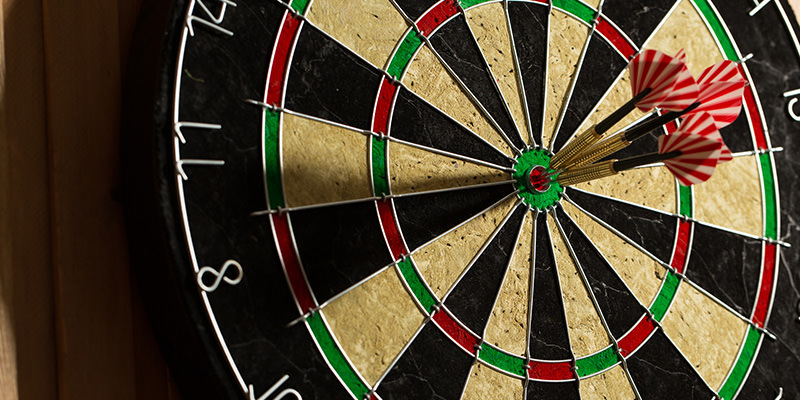
Walk into any pub in the world and more likely than not, alongside a bar, a couple of taps, and some beaten up stools, there’ll be a dartboard somewhere in the establishment. In addition to being a professional sport, darts is also a classic pub game all over the Northern Hemisphere. It’s one of the few things the Scandinavians, the Irish, the Germans, and even the Americans all have in common. The game consists of throwing small “missiles” at a circular, fixed board, and can be played with as few as two people or as many as two full teams. So where exactly did one of our most beloved bar games start?
Darts originated in the U.K. sometime in the mid-19th century. It’s been said that the game first started with soldiers throwing short arrows at tree trunks or the bottom of a barrel. Wood would dry out and cracks would form, creating “sections” on their makeshift boards. Apparently some woodworkers even began paying their bar bills by making homemade dartboards and giving them to pubs! Dartboards used to be called “butts,” coming from the French word for target. The first set of proper darts was crafted using wood, lead for weight, and turkey feathers.
Darts Rules & Basics
Many variations of darts exist, though the most commonly played version is 501. The correct placement of a fixed dartboard is 5 feet 8 inches from the ground, with the bullseye being the point of reference. The proper distance between player and board, from toeline to front of board, is just over 7 feet 9 inches.
According to the Professional Darts Corporation, each team (or individual player) starts out at 501, with the goal of working their way down to zero. Teams alternate taking turns, with each turn consisting of three dart throws per turn. At the end of each turn, the total number accrued from the three darts thrown is subtracted from 501; the bullseye is worth 50 points. The catch, however, is that in order to win, the final thrower on the team must reach zero with a double. That’s to say, if the team has 20 points left, the final thrower must hit the 10 twice. For odd numbers, the first dart must be used to change the number to an even (example, starting with 25 and scoring 5 points), then the doubling on the last two throws. Some variations of the game call for a “double start,” which incorporates this final process at the beginning as well. This is referred to as the “double in, double out” rule. Whichever team hits zero first wins. If neither team gets to zero in 20 turns, the team with the lower number of points wins. If the scores are tied at 20 turns, 10 additional rounds will be played. At 30 rounds, if the scores are still equal, the match concludes with a draw.
Tempted to join a dart league yet? Maybe not. Tempted to head to your local pub and get to practicing over a beer? We thought so.

